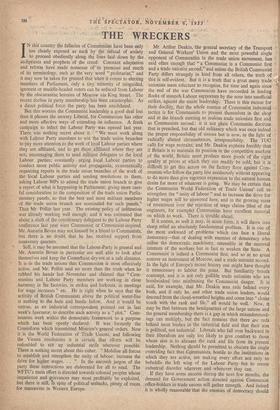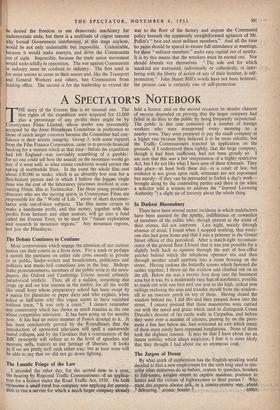THE WRECKERS
IN this country the fallacies of Communism have been only too clearly exposed as such by the refusal of society to proceed obediently along the lines laid down by the archpriests and prophets of the creed. Constant adaptation and reform have made nonsense or its premises and much of its terminology, such as the very word " proletariat," and it may now be taken for granted that when it comes to electing members of Parliament, only a tiny minority of misguided, ignorant or muddle-headed voters can be seduced from Labour by the obscurantist heresies of Moscow via King Street. The recent decline in party membership has been catastrophic, As a direct political force the party has been annihilated.
But this worries the Communist leadership a good deal less than it pleases the unwary Liberal, for Communism has other and more effective ways of extending its influence. A fresh campaign to infect the Labour Party was opened last year. There was nothing secret about it. " We must work along with Labour Party members to win the trade union branches to pay more attention to the work of local Labour parties where they are affiliated, and to get them affiliated where they are not; encouraging them to send militant delegates to the local Labour parties; constantly urging local Labour parties to conduct more public activity and propaganda; systematically organising reports in the trade union branches of the work of the local Labour parties and sending resolutions to them; asking Labour MPs to attend the trade union branch to give a report of what is happening in Parliament; giving more care- ful consideration to the composition of the trade union Parlia- mentary panels, so that the best and most militant members of the trade union branch are nominated for such panels." Thus Mr. Pollitt last year. The existing policy of infiltration was already working well enough; and it was estimated that about a sixth of the constituency delegates to the Labour Party conference last year were Communist or Communist-inspired. Mr. Aneurin Bevan may not himself be _a friend to Communists, but there is no doubt that he has received support from unsavoury quarters. - .
Still, it may be assumed that the Labour Party in general and Mr. Aneurin Bevan in particular are well able to look after themselves and keep the Commtnist dry-rot at a safe distance. It is in the trade unions that Communism is most effectively active, and Mr. Pollitt said no more than the truth when he rubbed his hands last November and claimed that " Com- munists and Labour Party members are working in close harmony in the factories, in strikes and lockouts, in meetings for wage increases " etc. He is right when he says that the activity of British Communism above the political water-line is nothing to the hum and bustle below. And it would be untrue, as an industrial correspondent pointed out in last week's Spectator, to describe such activity as a " plot." Com- munists work within the democratic ' framework to a purpose which has been openly declared. It was formerly the Cominform which transmitted Moscow's general orders. Now it is the World Federation of Trade Unions, and following the Vienna resolutions it is certain that efforts will be, redoubled to stir up industrial strife wherever possible. There is nothing secret about this either. " Mobilise all forces to establish and strengthen the unity of labour; increase the drive for higher wages. . . ." In the uncouth jargon of the party these instructions are elaborated for all to read. The WFTU's main effort is directed towards colonial peoples whose impatience and grievances may most profitably be exploited, but there is still, in spite of political setbacks, plenty of room for manceuvre in Western Europe. Mr. Arthur Deakin, the general secretary of the Transport and General Workers' Union and the most powerful single opponent of Communism in the trade union movement, has said often enough that " a Communist is a Communist first and a trade unionist second," and unless the British Communist Party differs strangely in kind from all others, the truth of this is self-evident. But it is a truth that a great many trade unionists seem reluctant to recognise, for time and again since the end of the war Communists have succeeded in leading flocks of staunch Labour supporters by the nose into unofficial strikes, against the union leadership. There is this excuse for their docility, that the whole essence of Communist industrial tactics is for Communists to present themselves in the shop and at the branch meeting as zealous trade unionists first and as Communists second: it is not plain Communist doctrine that is preached, but that old militancy which was once indeed the proper responsibility of unions but is now, in the light of radically altered circumstances, irresponsibility. The TUC calls for wage restraint; and Mr. Deakin explains forcibly that if Britain is to'maintain its position in the competitive markets of the world, Britain must produce more goods of the right quality at prices at which they can readily be sold; but it is difficult to get this across on the factory floor against Com- munists who follow the party line assiduously without appearing to do more than give vigorous expression to the natural human desire for more of whatever is going. We may be certain that the Communist World Federation of Trade Unions' call to strengthen the " unity of labour " and to increase the drive for higher wages rill be answered here, and in the growing mass of resentment over the rejection of wage claims (that of the engineers, for example) Communists have excellent material on which to work. There is trouble ahead.
If it comes, as well it may, in acute form, it will throw into sharp relief an absolutely fundamental problem. It is one of the most awkward of problems which can face a liberal democracy—that of dealing with enemies of democracy who utilise the democratic machinery, ostensibly in the material interests of the workers but in fact to weaken the State. A Communist is 'indeed a Communist first, and so at no great remove an instrument of Moscow, and a trade unionist second. In the light of Europe's recent history one might have thought it unnecessary to labour the point. But familiarity breeds contempt, and it is not only gullible trade unionists who are hoodwinked into minimising the Communist danger. It is said, for example, that Mr. Deakin sees reds behind every bush, and if only he, and other trade union leaders, would descend from the cloud-wreathed heights and come into " closr touch with the rank and file," all would be well. Now. it may be that between the headquarters of the large unions and the general membership there is a gap in which misunderstand- ings can multiply, but the fact remains that there are reds behind most bushes in' the industrial field and that their aim is political, not industrial. Liberals who fall over backward in their liberalism 'are only too likely to give comfort to those whose aim is to alienate the rank and file from its present leadership. Nothing should be permitted to obscure the single overriding fact that Communists, hostile to the institutions in which they are active, are making every effort not only to befuddle the left wing of the Labour Party but to create industrial disorder wherever and whenever they can.
If they have some success during the next few months, the demand for Government action directed against Communist office-holders in trade unions will gather strength. And indeed it is wholly reasonable that the enemies of democracy should be denied the freedom to use democratic machinery for undemocratic ends; but there is a multitude of cogent reasons Why formal Government interference, at this stage anyhow, would be not only undesirable but impossible. Undesirable, because it would make martyrs, and drive the Communists out of sight. Impossible, because the trade union movement would unite solidly in opposition. The war against Communists in industry must .be confined to industry. The first need is for more unions to come to their senses and, like the Transport and General Workers and others, ban Communists from holding office. The second is for the leadership to extend the war to the floor of the factory and expose the Communist policy beneath the apparently straightforward agitation of Mr. Pollitt's " best and most militant members." And all the time no pains should be spared to ensure full attendance at meetings,. for these " militant members " make easy capital out of apathy. It is by this means that the wreckers must be rooted out. Nor should liberals vex themselves. " The sole end for which mankind are warranted, individually or -collectively, in inter- fering with the liberty of action of any of their dumber, is self- protection." John Stuart Mill's words have not been bettered; the present case is certainly one of self-protection.



































 Previous page
Previous page